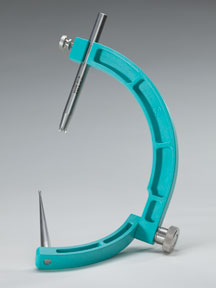Search Case Studies
End-Use Case Study
- Structural Compound Delivers Metal-Like Surgical Performance at Disposables Price

Problem was, one of the key instruments, a retrograde drill guide for the ankle, had never been made in a disposable plastic form before, and because the device needed to be very stiff and dimensionally accurate to facilitate the delicate surgery. Wright Medical engineers had their doubts whether it was even possible to do so, much less do so at a disposables price. Nevertheless, they put RTP Company’s engineers to work on the problem.
“This was completely investigatory; we were prepared to manufacture metal drill guides, even though we realized that providing an incomplete disposable kit that needed a separate reusable piece was a less than elegant solution,” explained Ryan Belaney, Wright Medical’s Product Development Engineer. “We had worked with RTP Company before and knew they were effective problem-solvers, so we figured, ‘let’s see what happens.'”
What happened, much to Belaney’s delight, was that RTP Company soon delivered not one, but two candidate materials that fully met Wright’s stringent stiffness requirements.
“We tried them out in a cadaver lab, and all the surgeons agreed that the guides worked very well and performed in the same manner as a metal guide,” said Belaney.
But even better news followed, when RTP Company informed Belaney of the materials’ cost. “We found that we would be able to manufacture plastic drill guides for less than half the cost of a metal version, handily meeting our desired price point for disposables,” he said.
The candidate materials were both RTP 300 Series glass fiber reinforced polycarbonate compounds, with each providing ISO 10993 compliance to meet biocompatibility requirements. Wright Medical decided to go with the higher loaded version in order to give surgeons an extra measure of stiffness.
A bonus has been the ability to brand the device in Wright Medical’s custom teal color to make it visually unmistakable in the marketplace by precoloring the compound.
“What RTP Company does is very unusual, I don’t know of any compounder that sends its experts out into the field to help solve engineering problems,” said Belaney.
“As engineers who typically work with metal, we don’t really know what plastics can do,” Belaney said. “RTP Company doesn’t just sell material, they educate us and open our eyes to innovative new possibilities, and that will help us to be even more successful in the future.”
Wright Medical Technology, based in Arlington, TN, is a global orthopaedic medical device company specializing in the design, manufacture, and marketing of reconstructive joint devices and biologics. For more information, please visit their website at www.wmt.com.




